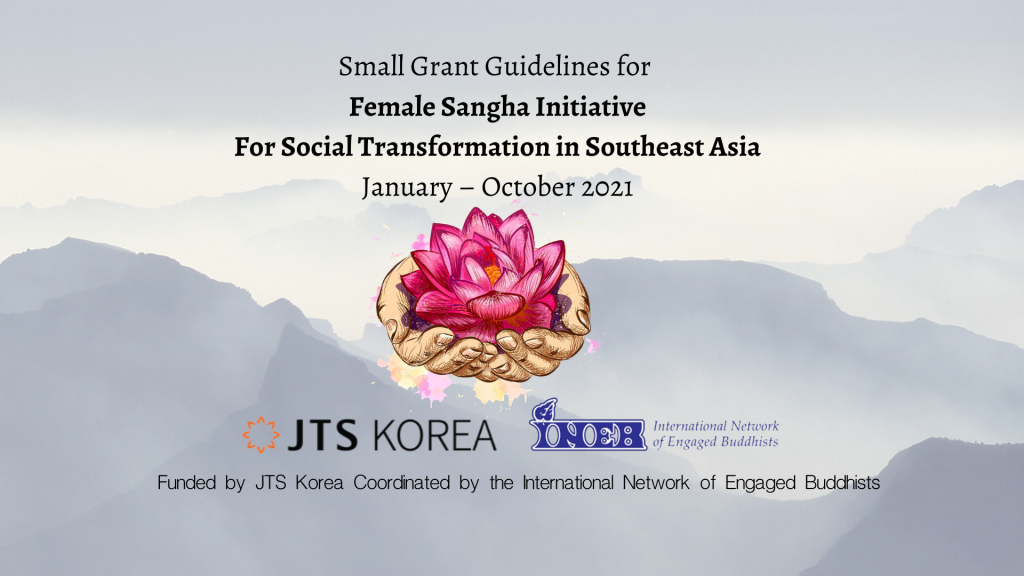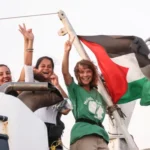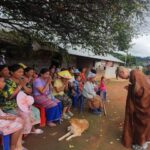January – October 2021


International Network of Engaged Buddhists
Overview
Southeast Asia is one of the most religiously diverse regions on earth with Hindus, Buddhists, Muslims, Christians, Sikhs, Jains, animists, and more. Women make up at least half of the population. Yet, due to patriarchy and institutionalized oppression which is present in all societal structures, including religions, their full participation and contributions to a harmonious and vibrant society are effectively limited.
Women-led socially engaged Buddhist work has not been a focus of any male-lead Buddhist institutions and work. Women’s problems were created and sustained by social structures and a practice of gender inequality and misogyny. This perpetuates societal imbalances, structural violence and unnecessary suffering.
With this in mind, we need to embrace a different worldview, methodology and commitment to create justice and equality that is inclusive and intersectional. It is a worldview based on a power-sharing culture, that sees and trusts every human being as equal in their rights, their wisdom, and their ability to lead change regardless of their sex, gender, ethnicity, religion, class, caste, age, ordained or lay.
The Female Sangha Initiative for Social Transformation in Southeast Asia is an opportunity for women throughout Southeast Asia to design and implement small projects that will address some of their immediate needs in their local communities.
Proposals may address social inequities and other issues within Buddhism such as:
- Poor education
- Structural oppression
- Materialism
- Monopolization of Buddhism by monks
- Patriarchy
Initiative Funded by JTS Korea
JTS Korea has generously provided 50,000 USD to INEB for this initiative in keeping with JTS Chairman, Venerable Pomnyun Sunim’s vision to empower Buddhist women (both lay and ordained) throughout Southeast Asia. The projects would create space for Buddhist women to participate more freely and actively in social activities that contribute to an environment and society within which equality for women is valued and actualized.
The Project’s Design and Goal
The goal is of empowering Buddhist women to engage more fully with social issues locally, regionally, and globally with values guided by the Buddha-Dharma.
These guidelines have been developed by the INEB Secretariat in consultation with the members from INEB’s Advisory Council and Executive Committee, and JTS Korea. The project is designed to build close collaborations and networks among Buddhist women, both lay and ordained, within their community, country and within the region so that they can support each other to be actively involved in contributing to a just and peaceful society.
Objectives
- To improve the quality of life and equal participation of Buddhist women through increasing their opportunities for fully engaging in community life by supporting and nurturing diverse sustainable models for community living
- To improve education for Buddhist women, both monastic and lay
- To support women working toward pluralistic harmonious societies with women at the core.
Grant Themes may include:
- Capacity building for women and gender equality
- Uplifting the status of women in organizations and communities
- Piloting sustainable community models
- Women led peacebuilding initiatives promoting religious pluralism
Amount of Funds Available
Applicants may request up to 5,000 USD as startup funds. Applicants may be non-profit organizations or groups.
Including matching funds in the proposal will increase the likelihood of receiving funding approval.
What this Initiative will Not Fund
While not a definitive list, we will not fund requests for the following:
- Capital projects (the purchase, construction or renovation of buildings and related facilities)
- Individuals
- Fundraising events
- Equipment
- Salaries
Project Eligibility Criteria and Scope
The funds are available to applicants in Southeast Asia, across all Buddhist traditions, at the grassroots level, among untouchables, as well as other marginalized communities. Applicants may be registered nonprofit organizations and small groups of at least three persons who have a joint bank account.
Small Grant Selection Process
Approximately 10 successful applicants will be selected by a Screening and Selection Committee.
INEB will contact the finalists and conduct a telephone interview with them.
Coordination and Technical Support
INEB staff will coordinate the initiative and communicate with the projects throughout 2021.
Time Schedule
| Activity | Date |
| Announce funds are available | December 2020 |
| Proposals submitted | January 1 – 31, 2021 |
| Proposals reviewed and selected for funding | February 1 – 28, 2021 |
| Announce applicants selected & funds awarded | February 28, 2021 |
| Project implementation | March – August, 2021 |
| Mid-Term report | May 31, 2021 |
| Final report | August 31, 2021 |
| Consolidated Final Report | October 2021 |
Contact Information
International Network of Engaged Buddhists
666 Charoen Nakorn Road, Klongsan, Bangkok 10600 Thailand
Email: Opor Srisuwan, Project Coordinator – compassion@inebnetwork.org
Rita Litwiller, Program Coordinator – project@inebnetwork.org











